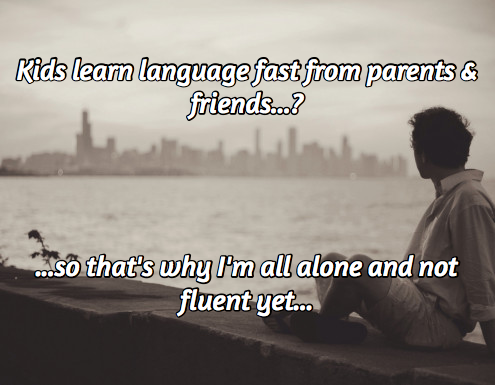Warning, long article ahead. Maybe a 5 minute read.
So let’s cut through the fat. Can you learn language like a child?
The quick answer is no. Unless you’re actually a child… that somehow found their way onto the internet… and even more mysteriously, somehow ended up on this site instead of looking at Pokemon on Youtube.
Why? You’re not a child. You’re a little smarter.
Your brain is now overloaded with facts, experiences, emotions, needs, issues, and all sorts of crap adults think about. Kids on the other hand have very little to none of that.
They’re pretty stupid.
What do language learning products mean when they say you’ll learn like a child?
It means they’ll show you foreign words and a picture alongside. And maybe an audio pronunciation. And you, having no background knowledge of the language, must guess what it is.

Sounds good right?
It sounds good until you realize you could’ve learned these words INSTANTLY by simply reading a textbook or dictionary.
Difference with kids is that they’re learning with all senses. Sight, touch, taste, smell, hearing. And they have an adult to guide them.
Maybe you’d be better off doing a home-stay program and learning language in a non-English speaking household.
But no. Here you are, looking at pictures.
So, any language program that claims to teach you a language in the fashion that kids learn… won’t really teach you much.
It’s great marketing. But, it doesn’t work well.
But wait, the title is “Learning Language Like A Child. Why SOME Of It Works.”
So is there anything you can learn from how kids learn? Yes.
Here’s what you can apply to your language learning from kids.
1) Kids are stupid. Kids have no ego or emotional issues.

Here’s the crazy part – stupid is a good thing.
As a result, kids are prone to asking “why” and “why” and “why” until you run out of answers. They’re ignorant (well, maybe I shouldn’t have called them stupid…), and thus, they’re curious.
Now compare that to a smart adult that goes
- “pfff.. I know everything, no need for me to learn a new language.”
Curiosity keeps kids engrossed in an activity. Give them a puzzle, a game, a book and they spend hours on it. Any normal adult would lose all interest within ten minutes.
Kids also lack ego and emotional issues that adults pile on.
A kid would be more likely to say:
- “I dont know Spanish? OK, I’ll learn it.”
Ask a typical adult to learn Japanese… and they’ll go
- “Oh… that sounds hard. It’s not practical. All those characters…. Why would you even bother? Oh, and no time.

I actually had a classmate that was shocked (seriously, who gets shocked at things like that anymore) at my choice of learning Japanese.
It’s too hard. It’s impossible. “Why not something easier like Spanish?” Enough said.
What can you learn from kids?
Drop the ego when it comes to learning. Be open minded.
I guarantee this is the underlying principle of why kids can master a language faster than any immersion tactics, super innovative brain-researched technology, and whatever else language products market these days.
And this advice is hard to follow as well. You can read it. Agree with it. It sounds good. You feel good after reading it. But you do nothing. (That’s how the self-help industry works, by the way.)
If you did not grow up with the concept of being “open minded” and “fully engaging” your topics of interest without nagging doubts, distractions, then you’re going to have a hard time.
Unless you actually practice.
2) Kids have a lot of time.
What do you need to learn a language? Well… aside from some books, some native speakers and maybe a pencil… you need time.
Yes, time. Kids have tons of it. No jobs. No responsibilities.

Do you know who buys “Learning Language for Busy People” products?
Adults.
Do you know anyone that has gotten fluent with these?
I don’t.
Unless you’re a casual learner and don’t give care about how fluent you’ll get… and just want some foreign words in your head… those will serve you well. But if you actually want to get a decent level at Russian, Japanese, Korean, or… I don’t know… Polish, you need to put in the consistent time.
Nothing works out without consistent effort.
What can you do?
Well, if you’re as serious about language learning as you say, you’ll have to devote at least an hour a day. Or 30 minutes. No excuses. Say no to your Friday night drinking affairs. Lose an hour of sleep if you must.
You’ll find that you always have time.
3) Kids have the best language tutor ever.
Who do you think hangs around kids all day. Who points to an apple and asks – “Little Billy… can you say Ahh-pull?”
Their parents. Kids aren’t learning language alone, unlike most adults.
Parents hover over their kids for a majority of their young lives. They talk to them. They ask them questions. They get the kids to speak.
Do you have a parent hovering over you at all times? No?
Well, that’s why you can’t learn as fast as a child.
And if not their parents, it’ll be their friends or teachers.

But here’s what you can do.
You’ll need someone, preferably a native speaker, as well. Kids are not learning alone when it comes to languages. Textbooks and apps are a nice start but having access to your best language tutor ever will seal the deal.
Hire a tutor.
Hire a Spanish speaking hover-parent.
Do skype sessions.
Am I missing anything?
Help me add more to this list. Leave a comment below.
See you in the comments!
– Linguajunkie
[…] Promising That You’ll Learn Languages Like a Child […]
[…] there’s this whole idea going around that kids learn language better than adults. You can read more about that here. But how about adults. Surely, with the experience they’ve had in this world… they can […]
kids also have 15-16 years before they’re required to actually know the language well… -_- as for me, when an adult learns foreign language, it seems always important to concentrate on the final goal. beause one can’t “know the language”, it’s an abstraction. I’m russian and still i find in a dictionary some words that i don’t know, I can’t explain some grammar, and i even can’t communicate in some special situations that are outside my everyday and professional experience.. so, when somebody wants to learn a language, it’s always useful for him to ask himself – what will I… Read more »